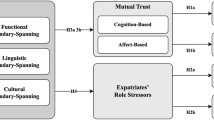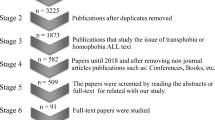Abstract
This article analyses MNCs, worker identity and the ethical vulnerability caused by over-reliance on expatriate managers and under-reliance on local managers, who are often undervalued. It is argued that MNCs not only need but also have an obligation to assess local managers’ knowledge and contributions as having not only operational and market values, but also institutional value. Local managers both give access to and form part of local social capital and the treatment they receive is an element in the CSR performance of the MNCs. Recognition of the value of equal treatment creates an ethical imperative that the barriers of cultural difference be overcome. We see such an approach towards local managers as more fully taking into account the human rights of these local managers. Such a holistic approach is increasingly relevant for MNCs in the 21st century, as MNCs increasing globalize into new large emerging markets such as Brazil, Russia, India and China.

Similar content being viewed by others
References
Atamer, T., & Schweiger, D. M. (2003). Transnational horizontal project teams. Journal of World Business, 38, 81–83.
Banai, M., & Sama, L. M. (2000). Ethical dilemmas in MNCs’ international staffing policies: A conceptual framework. Journal of Business Ethics, 25, 221–235.
Bartlett, C. A., & Ghoshal, S. (1989). Managing across borders: The transnational solution. Boston, MA: Harvard Business School Press.
Boulding, K. (1962). Conflict and defence: A general theory. New York: Harper.
Briand, L., & Bellmare, G. (2006). A structural analysis of post-bureaucracy. Journal of Organizational Change Management, 19, 65–79.
Coleman, J. (1990). Foundations of social theory. Cambridge: Belknap Press of Harvard University Press.
Daspro, E. (2008). An analysis of U.S. multinationals’ recruitment practices in Mexico, Journal of Business Ethics, 1573-0697 (Online).
Donleavy, G., Lam, K., & Ho, S. (2008). Does east meet west on business ethics. Journal of Business Ethics, 79, 1–8.
Dunbar, R. L. M., & Kotha, S. (2000). Managing institutional and cultural contrasts: The case of Sanyo electric in the United States. Advances in International Comparative Management, 13, 149–173.
Elster, J. (1989). The cement of society: A study of social order. Cambridge: Cambridge University Press.
Everett, J. E., & Stening, B. W. (1989). The overseas assignment preferences of Japanese managers. Environment and Behavior, 21, 151–174.
Foss, N. (2007). The emerging knowledge governance approach. Organization, 14, 29–52.
Goodall, K., & Roberts, J. (2003). Only connect: Teamwork in the multinational. Journal of World Business, 38, 150–164.
Greenwood, M. R. (2002). Ethics and HRM: A review and conceptual analysis. Journal of Business Ethics, 36(3, 3), 261–278.
Hancock, P. (2006). Spatial and temporal mediation in social change. Journal of Organizational Change Management, 19, 619–639.
Hennart, J. F. (2001). Theories of multinational enterprise. In A. M. Rugman & T. L. Brewer (Eds.), The Oxford handbook of international business (pp. 127–149). Oxford: Oxford University Press.
Hofstede, G. (2001). Culture’s consequences: Comparing values, behaviors, institutions, and organizations across nations. Thousand Oaks: Sage.
Hull, R. (2006). Workload allocation models. Journal of Organizational Change Management, 19, 38–53.
Imbun, B. Y. (2007). Cannot manage without the‚significant other’: Mining, corporate social responsibility and local communities in Papua New Guinea. Journal of Business Ethics, 73(2), 177–192.
Inkpen, A. C. (1995). The management of international joint ventures: An organizational learning perspective. London: Routledge.
Josserand, E., Teo, S., & Clegg, S. (2006). From bureaucratic to post-bureaucratic. Journal of Organizational Change Management, 19, 54–64.
Keohane, R. (1988). International Institutions: Two approaches. International Studies Quarterly, 32, 379–396.
Kobrin, S. J. (1992). Expatriate reduction and strategic control in American multinational corporations. In V. Pucik, N. M. Tichy, & C. K. Barnett (Eds.), Globalizing management: Creating and leading the competitive organization (pp. 263–275). New York: Wiley.
McGuire, P., & Hutchings, K. (2006). Machiavellian analysis of organizational change. Journal of Organizational Change Management, 19, 192–209.
McSweeney, B. (2006). Are we living in a post-bureaucratic epoch? Journal of Organizational Change Management, 19, 22–37.
Mead, R. (1998). International management: Cross-cultural dimensions (2nd ed.). Cambridge, MA: Blackwell.
Michalos, A. (2008). Ancient observations on business ethics: Middle East meets West. Journal of Business Ethics, 79, 9–19.
Millar, C. C. J. M. (2008). Eve’s apple has many skins: The human core of innovation and knowledge transfer. Enschede: Twente University Press.
Millar, C. C. J. M., & Choi, C. J. (2008). Worker identity, the liability of foreignness, the exclusion of local managers and unionism: A conceptual analysis. Journal of Organizational Change Management, 21(4), 460–470.
Morrison, A. (2001). Integrity and global leadership. Journal of Business Ethics, 31(1), 65–76.
North, D. C. (1990). Institutions, institutional change and economic performance. Cambridge: Cambridge University Press.
O’Grady, S., & Lane, H. (1996). The psychic distance paradox. Journal of International Business Studies, 27, 305–333.
Olson, M. (1992). The hidden path to a successful economy. In C. Rausser & G. Clague (Eds.), The emergence of market economies in Eastern Europe. London: Blackwell Publishers.
Ostrom, E. (1998). A behavioural approach to the rational choice theory of collective action. American Political Science Review, 92, 1–21.
Peng, M., & Heath, P. (1996). The growth of the firm in planned economies in transition: Institutions, organizations and strategic choice. Academy of Management Review, 21, 492–528.
Pless, N., & Maak, Th. (2004). Building an inclusive diversity culture: Principles, processes and practice. Journal of Business Ethics, 54(2), 129–147.
Pucik, V. (1994). The challenges of globalization: The strategic role of local managers in Japanese-owned US subsidiaries. In N. Campbell & F. Burton (Eds.), Japanese multinationals: Strategies and management in the global Kaisha (pp. 218–239). London: Routledge.
Putnam, R. D. (1993). The prosperous community: Social capital and public life. American Prospect, 4, 13.
Putnam, R., Leonardi, R., & Nanetti, R. Y. (1993). Making democracy work: Civic traditions in modern Italy. Princeton: Princeton University Press.
Rugman, A. M., & Verbeke, A. (2003). Extending the theory of the multinational enterprise: Internalization and strategic management perspectives. Journal of International Business Studies, 34, 125–137.
Spender, J.-C., & Scherer, A. (2007). Philosophical foundations of knowledge management. Organization, 14, 5–28.
Thomas, D. C. (1998). The expatriate experience: A critical review and synthesis. Advances in International Comparative Management, 12, 237–273.
Tsalikis, J., & Seaton, B. (2008). The international business ethics index: European Union. Journal of Business Ethics, 75, 229–238.
Vance, C. M., & Paik, Y. (2005). Forms of host country national learning for enhanced MNC absorptive capacity. Journal of Managerial Psychology, 20(7), 509–606.
Waistell, J. (2006). Metaphorical mediation of organizational change. Journal of Organizational Change Management, 19, 640–654.
Wines, W. (2008). Seven pillars of business ethics. Journal of Business Ethics, 79, 483–499.
Winstanley, D., Woodall, J., & Heery, E. (1996). Business ethics and human resource management: Themes and issues. Personnel Review, 25(6), 5–12.
Zaheer, S. (1995). Overcoming the liability of foreignness. Academy of Management Journal, 38, 341–357.
Zakhem, Z. (2008). Stakeholder management capability. Journal of Business Ethics, 79, 395–405.
Author information
Authors and Affiliations
Corresponding author
Rights and permissions
About this article
Cite this article
Millar, C.C.J.M., Choi, C.J. MNCs, Worker Identity and the Human Rights Gap for Local Managers. J Bus Ethics 97 (Suppl 1), 55–60 (2010). https://doi.org/10.1007/s10551-011-1078-4
Published:
Issue Date:
DOI: https://doi.org/10.1007/s10551-011-1078-4




